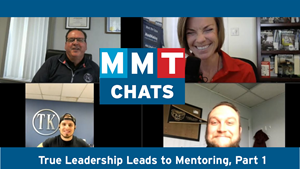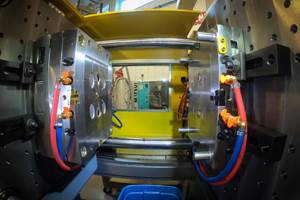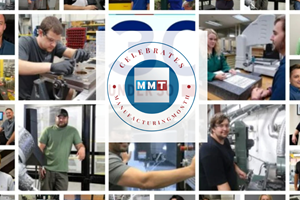SPI Machinery, Molders & Moldmakers Divisions
The missing link in the SPI, the MoldMakers Division strives to educate and keep the moldmaking industry competitive.
The beginning of the Machinery, Molders & Moldmakers Divisions of the Society of the Plastics Industry (SPI) (Washington, D.C.) - founded approximately 50 years ago - was almost an afterthought. Once the SPI had been up and running for 20 years or so, its founders realized that a vital link in the chain was missing.
Walt Bishop, executive director of the SPI Machinery, Molders & Moldmakers divisions, explains, "Originally, the SPI's mission was simple: to leverage the buying power of the processors and strengthen their relationships with material and equipment processors. Then they started to realize that something was amiss, and that was the moldmakers. You can't run raw material through a machine without a mold in it - if you are going to have a finished product, you have to have a mold to make that product. So, they then integrated the machinery and the moldmakers as divisions of SPI."
Overcoming Obstacles
Back then, the Moldmakers Division numbered no more than a dozen companies. Today, the organization stands at about 7,000 individuals strong from 80 or so companies, and the division is no longer an afterthought, but on the forefront of Bishop's mind. Armed with two full-time employees, the three of them are facing head-on what Bishop deems are the two biggest challenges today's moldmakers face: education and offshore competition.
"Competing with offshore molds has been at the forefront of the industry for some time," Bishop says, "followed by the need to train and educate qualified moldmakers to come in and take the jobs of their forefathers, who are now getting ready to retire." To that end, the division established The Education Foundation in 1994. To date, the foundation has dispersed more than $25,000 directly to institutions and/or organizations that offer moldmaking as a specific curriculum either in their vocational school or moldmaking courses in junior colleges.
"Moldmaking has become such a high-tech business now - you really have to understand computer technology, metallurgy and all of the different interfaces that go along with producing molds, like hot runner systems, etc.," he says. "It's a lot more involved and therefore the education gap has to be closed considerably."
A significant part of closing the gap is fighting the stereotype that moldmaking is a "dirty" profession, Bishop continues. "We need to let people know that not everyone has to go to college to make something of themselves," he notes. "Moldmaking is creative work, and our biggest challenge now is getting that word out. If you are good with your hands, have a fair amount of knowledge of math and want to get into something that is personally rewarding and that gives you a finished product in your hand at the end of the day - this is the field for you to explore."
The Division is trying to reach individuals at the high school level and reaching out to educators to help spread awareness. "We need high schools to partner with someone local in the industry to get some basic machine tools and get the students basic, fundamental education," he states. "Then they could contact moldmaking shops to get the students on-the-job training for a few hours in the afternoon. That will work immeasurably to help close the gap. Get them some experience, let them see that it's not a grimy business - you can go into a nice environment with all of the benefits that you could possibly need, make great money right off the bat and learn a trade."
As for offshore competition, the issue is not simply black-and-white. "We are striving to insure the vitality of the U.S. moldmaking industry in light of the overseas and offshore competition," Bishop says. "Smart companies are finding partners in these countries to start the molds over there - do the first cut if you will - then ship it back over here and let the U.S. quality in the manufacture of molds become an integrated part of that mold. So they are working together and that seems to be the wave of the future. If you can't beat them, you might as well join them if you want to stay in business."
Focus on the Future
The Division will start a statistical program for molds and mold bases to help increase industry awareness and give moldmakers a better understanding of the dynamics of the industry, so they can adjust their business operations accordingly. "We are going to try and count how many mold bases are consumed in the U.S. during the course of a year by tracking sales quarterly," Bishop explains. "This should give moldmakers an idea of how many molds are sold, since there is a corollary between how many mold bases are sold to how many molds are sold. We are starting with mold bases because it's easier to report; we don't want to burden moldmakers with a lot of details or scare them into not wanting to report anything and lose trust in us.
"There's maybe a dozen mold base manufacturers in the U.S. and if we can get them to participate - and right now we have 75 percent agreeing to participate - we can start to put some numbers out there that people may find meaningful," Bishop continues. "Our ultimate objective is to instill enough confidence in the mold base program that the next logical extension would be to report mold sales. We'll start slow and build up to full speed."
Bishop also plans to continue growing the division's membership. "We will keep striving to provide value to our members and the industry at large and to enjoy ourselves doing it," he adds. "Because that's what it's really all about, isn't it?"
Related Content
ICYMI: MMT Chats: True Leadership Leads to Mentoring, Part 1
This trio from TK Mold and Engineering in Romeo, Michigan, joins me to discuss the role of leadership and culture in mentorship. This episode is brought to you by ISCAR with New Ideas for Machining Intelligently.
Read MorePredictive Manufacturing Moves Mold Builder into Advanced Medical Component Manufacturing
From a hot rod hobby, medical molds and shop performance to technology extremes, key relationships and a growth strategy, it’s obvious details matter at Eden Tool.
Read More30 Under 30: The New Face of Moldmaking
Young professionals are vital to the moldmaking industry, and it is important to acknowledge those making strides in shaping the industry's future. MoldMaking Technology recognizes the industry's young talent through its inaugural 30-Under-30 Honors Program.
Read MoreMaking Quick and Easy Kaizen Work for Your Shop
Within each person is unlimited creative potential to improve shop operations.
Read MoreRead Next
How to Use Continuing Education to Remain Competitive in Moldmaking
Continued training helps moldmakers make tooling decisions and properly use the latest cutting tool to efficiently machine high-quality molds.
Read MoreReasons to Use Fiber Lasers for Mold Cleaning
Fiber lasers offer a simplicity, speed, control and portability, minimizing mold cleaning risks.
Read More






_300x250 3.png;maxWidth=300;quality=90)




.jpg;maxWidth=300;quality=90)











